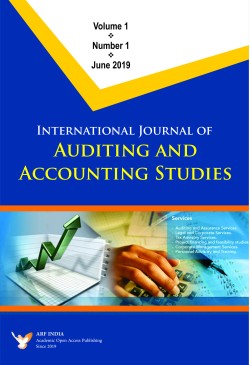
International Journal of Auditing and Accounting Studies
Frequency :Bi-Annual
ISSN :2582-3272
Peer Reviewed Journal
APPLICATION OF BENFORD’S LAW AND THE DETECTION OF ACCOUNTING DATA FRAUD IN NIGERIA
Keywords: Benford’s Law, Data Fraud, Detection, Audit Effectiveness.
Etim Osim Etim, Emmanuel E. Daferighe, Augustine Brenden Inyang & Michael Esua Ekikor (2023). Application of Benford’s Law and the Detection of Accounting Data Fraud in Nigeria. International Journal of Auditing and Accounting Studies. 5(2), 119-163. https://DOI:10.47509/IJAAS.2023.v05i02.01
FACTORS INFLUENCING THE INDEPENDENCE OF PUBLIC-SECTOR AUDITOR: A LITERATURE REVIEW
Vu Anh Doan & Hung Xuan NGUYEN (2023). Factors Influencing the Independence of Public-Sector Auditor: A Literature Review. International Journal of Auditing and Accounting Studies. 5(2), 165-181. https://DOI:10.47509/IJAAS.2023.v05i02.02
CORPORATE CONTRIBUTION FOR SUSTAINABLE DEVELOPMENT: A CASE FROM A MANUFACTURING SECTOR ORGANISATION IN SRI LANKA
Rajapakse, R.M.T.C.B. & Rajapakse, R.M.R.B. (2023). Corporate Contribution for Sustainable Developemnt: A Case from a Manufacturing Sector Organisation in Sri Lanka. International Journal of Auditing and Accounting Studies. 5(2), 183-214. https://DOI:10.47509/IJAAS.2023.v05i02.03
COST REDUCTION STRATEGIES AND FINANCIAL PERFORMANCE OF LISTED CONSUMER GOODS COMPANIES IN NIGERIA
The purpose of this study is to assess the association between cost-cutting measures and the financial performance of Nigerian consumer product companies that are publicly traded. Data for the study was gathered from the annual reports of six consumer products companies listed on the Nigerian Stock Exchange over a five-year period (2017–2021). While net profit was employed as the measure of financial performance, the study used change in material cost, change in labour cost, and change in overhead cost as cost reduction measures. Descriptive statistics, multiple regression, and correlation coefficients were used to obtain the results. The empirical results showed a substantial positive link between cost-cutting measures and financial performance. The study comes to the conclusion that financial performance is impacted by cost reduction strategies. It was advised that value-engineering research be used to cut costs as much as possible.
???????Keywords: Cost Reduction Strategies, Value Engineering, Work Study, Net Profit
NWANYANWU, Kingdom Uchenna, JONAH, Ngbomowa Moses & COURT, Eunice Ralph (2023). Cost Reduction Strategies and Financial Performance of Listed Consumer Goods Companies in Nigeria. International Journal of Auditing and Accounting Studies. 5(2), 215-228. https://DOI:10.47509/IJAAS.2023.v05i02.04
THREATS OF PERSONAL TIES TO AUDITOR INDEPENDENCE IN SAUDI ARABIA: AN EMPIRICAL INVESTIGATION
As “social animals,” auditors rely on the data and the social influences of their clients (Kleinman & Palmon, 2001, 10), putting their independence at risk. While conducting an audit, an auditor is not working alone. The auditor must communicate with the client management while performing the audits, which may negatively impact the auditor’s independence in a number of ways. Only the auditor can determine whether the audit was conducted objectively or if its independence has been compromised. The survey respondents agree that, in their experience, 15 of the 20 personal ties-related factors that were included in the study had an impact on the independence of Saudi Arabia’s auditors. Despite the fact that respondents agreed that auditors can keep their personal feelings distinct from their professional judgement, they were confused about whether or not ties with client management had a detrimental impact on objectivity and independence. Auditors have the option to refuse to let personal relationships compromise their objectivity. They may reply in real-time to the seduction of their client management.
Keywords: Independence; Personal Ties; Auditing; Threats.
Raghad Mesfer Alghamdi & Khalid Al-Adeem (2023). Threats of Personal Ties to Auditor Independence in Saudi Arabia: An empirical Investigation. International Journal of Auditing and Accounting Studies. 5(2), 229-248. https://DOI:10.47509/IJAAS.2023.v05i02.05